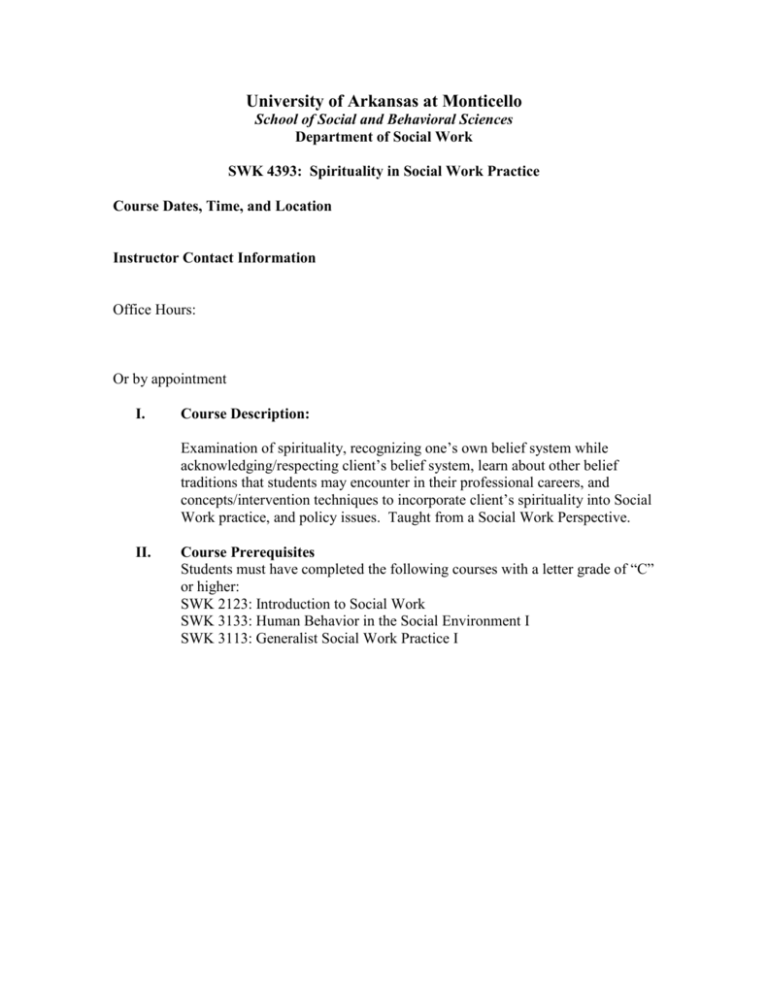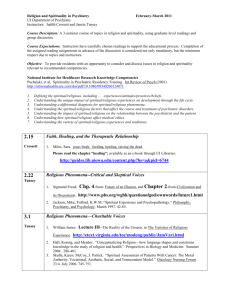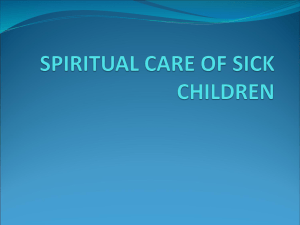SWK 4393 Spirituality in Social Work Practice
advertisement

University of Arkansas at Monticello School of Social and Behavioral Sciences Department of Social Work SWK 4393: Spirituality in Social Work Practice Course Dates, Time, and Location Instructor Contact Information Office Hours: Or by appointment I. Course Description: Examination of spirituality, recognizing one’s own belief system while acknowledging/respecting client’s belief system, learn about other belief traditions that students may encounter in their professional careers, and concepts/intervention techniques to incorporate client’s spirituality into Social Work practice, and policy issues. Taught from a Social Work Perspective. II. Course Prerequisites Students must have completed the following courses with a letter grade of “C” or higher: SWK 2123: Introduction to Social Work SWK 3133: Human Behavior in the Social Environment I SWK 3113: Generalist Social Work Practice I III. Purpose of Course: The mission of UAM is to educate students for productive and fulfilling lives in a global environment by providing opportunities for intellectual growth, individual enrichment, skill development, and meaningful career preparation. This course addresses these issues by enhancing the ability of the student to recognize their own individual beliefs without forcing them on their clients; learn about various other belief systems which they might encounter in their professional careers; and come to respect and value the particular spiritual beliefs of an individual and/or family client system despite the differences from the student’s own beliefs. This course is an examination of Spirituality including, but not limited to definitions of spirituality and religion; an exploration of human behavior in relation to their own personal belief system; concepts and/or techniques of intervention regarding a client’s belief system; policy issues which might come into question when considering some clients’ beliefs, and how Social Workers can effectively incorporate their clients’ spirituality into their Social Work practice. Students will gain an understanding of spirituality in regards to how it may effects one’s practice and will be equipped with knowledge to help them practice more successfully regardless of their or their clients’ spiritual background. IV. Course Objectives: Upon completing the course requirements the student should be able to: 1. Describe and reflect critically upon the implications of human diversity for social work theory, research, policy, and practice. 2. Evaluate their personal and professional views with regard to cultural competency in work with diverse populations, with special regard to spiritual and religious aspects. 3. Describe, analyze, and respond to specific needs and strengths of diverse groups. 4. Identify and critically reflect on diverse religious and nonreligious spiritual perspectives and their implications for social work practice. 5. Understand and analyze the history of the relationship between religion and social work as well as the current state-of-the-art for culturally competent, ethical and spiritually-sensitive social work practice. 6. Understand and formulate qualities of a spiritually-sensitive helping relationship and implications to proposed practice situations. 7. Understand and critically evaluate guidelines for spiritually-sensitive bio-psychosocial assessment of human development and well-being. 8. Identify strategies for effective cooperation with religious and nonreligious spiritual support systems of clients regarding both direct and indirect practice. 9. Identify and critically evaluate practical, theoretical, ethical and research-based guidelines for utilizing religiously derived social work practice activities, such as religious symbolism, prayer, meditation, ritual, and referral to and collaboration with religiously affiliated social service agencies and community organizations. 10. Understand the supportive and oppressive aspects of religious and spiritual perspectives concerning issues of human diversity, such as gender, ethnicity and culture, age, sexual orientation, ability, and social class. 11. Apply to practice a framework of knowledge, theory, values, and skills for spiritually-sensitive social work. V. Required & Supplementary Text(s): Canda, E. R. & Furman, L. D. (2010). Spiritual diversity in social work practice: The heart of helping. NY: Oxford University Press. Other readings and or class activities may be assigned at the instructor’s discretion. VI. Course Outline: Introduction to Course Review of syllabus, course requirements and expectations Class Contract Begin Chapter 1: Guiding Principles Top 3 activity Chapter 1 continued Top 3 activity Journal Entry on Canda & Furman chapter one due. Labor Day: No class Begin Chapter 2: Compassion, the Call to Service, and Ethical Principles for Social Work Review Spiritual Auto-Biography Top 3 activity Chapter 2 continued Top 3 activity Begin Chapter 3: The Meaning of Spirituality Top 3 activity Chapter 3 continued Top 3 activity Begin Chapter 4: Human Diversity, Spirituality and Social Work Practice Top 3 activity Chapter 4 continued Top 3 activity Begin Chapter 5: Religious Perspectives on Social Service and Insights into Social Work Practice pp. 143-162 Top 3 activity Chapter 5 continued pp. 162-184 Spiritual Auto-Biography Due Top 3 activity Begin Chapter 6: Nonsectarian Spiritual Perspectives, Comparisons, and Implications for Cooperation. Top 3 activity Chapter 6 continued Review Research Requirements Top 3 activity Begin Chapter 7: Creating a Spiritually Sensitive Context for Social Work Practice Top 3 activity Journal entries on Canda & Furman chapters two through six due in class. Chapter 7 continued Top 3 activity Begin Chapter 8: Understanding and Assessing Spiritual Development Top 3 activity Chapter 8 continued Top 3 activity Begin Chapter 9: Ethical Guidelines for Spiritually Sensitive and Culturally Appropriate Practice Top 3 activity Chapter 9 continued Top 3 activity Begin Chapter 10: Spiritually Oriented Transformational Practice Top 3 activity Chapter 10 continued Top 3 activity Independent Research No Class-Thanksgiving Holiday!! Begin Chapter 11: A Worldwide View Top 3 activity Research Papers Due Chapter 11 continued Top 3 activity Research Presentations Research Presentations Final Exam: Date/Time To be announced VII. Course Requirements: Students should have read prior to class so that they may participate knowledgably in class discussions Attendance and Participation: You are expected to attend and to participate in all class sessions. 100 points of your grade will come from participating in class discussions and/or activities. You will be expected to read the assigned material before class and be prepared to discuss the material in class. To that end, for each day of class you will be expected to turn in your Top 3 Assignment. Each Top 3 will be worth 5 points. This assignment will consist of a 1 page summary listing the three things you found most interesting, shocking or useful found in the assigned material. This assignment will be used as a roll as well as instigating class discussion. Missing more than two (2) class sessions will result in a drop of one (1) letter grade. If you anticipate missing a class due to an unavoidable circumstance or in the event of an emergency, please make every effort to discuss this with me beforehand. If this is not possible, please do so as soon as possible after the missed class session. Spiritual Auto-Biography: This is a personal reflection paper; sources can be used to emphasize a point, but are not required. This paper will be a personal review of your own personal beliefs and history regarding spirituality and/or religion. Specific requirements regarding this assignment will be provide in class. This assignment is worth 100 points. Journal Entries: Students will choose exercises from the end of each chapter and complete the exercises as instructed. Students will be expected to complete these exercises while covering each chapter in class. The entries will be turned in periodically throughout the semester. Specific instructions for each exercise are provided at the end of each chapter. An example will be provided in class. The first Journal entry will not count towards the journal grade. There will be 10 journal entries worth 50 points each for a total of 500 points. Final: Your final will consist of two parts; a research paper and presentation of your research. The Final will be worth a total of 200 points; 150 points for the research paper and 50 points for the presentation. Research Paper: Students will choose a spiritual/religious group which they are not familiar with and complete a research paper on the chosen group. This paper will be a formal research paper and must be written in APA format. This paper will require a minimum of 6 outside sources and be a minimum of 6 pages long. Specific details regarding the requirements of this assignment will be provided in class. Research Presentation: Students will prepare and present information based on their research. The presentation should not only reflect the research on the chosen spiritual/religious group, but also the effect the research had on the student. Presentations can take many forms and students are encouraged to use their creativity when preparing their presentations. Specific details regarding this assignment will be provided in class. VIII. Evaluation and Grading: Students will be evaluated based on the performance on assignments given. A total of 1000 points will be possible. Grades will be based upon a percentage of the total points available. The scale is as follows: 90-100%= 80-89% = 70-79% = 60-69% = < 60% = A B C D F Top 3 (5 pts each) Spiritual Autobiography Journal Entries Research paper Presentation Total Points Possible = = = = = = 100 pts. 100 pts. 500 pts. 150 pts. 50pts 900 pts. Grading Criteria for All Written Assignments The grade for papers will be based on the following: A. Presentation and Appearance 1. Neatness 2. Correct grammar (noun-verb agreement, sentence structure, proper and consistent verb tense, etc.) 3. Spelling 4. Punctuation B. Organization 1. Structure and format of the paper 2. Logical sequencing and continuity of ideas 3. Clarity of expression 4. Conciseness 5. Thoroughness All formal papers will be typed, double-spaced and paginated. APA style is to be used, including in-text references and the reference list. APA manuals are available at the bookstore and would be a valuable resource in your library. Students experiencing writing difficulties are advised to seek assistance at the Writing Center in MCB 113. Please call (870)460-1378 or drop by HH 212 to schedule an appointment. IX. Academic Dishonesty: Academic dishonesty (including cheating on exams and plagiarism in papers) is not consistent with ethical conduct in social work practice and is unacceptable in social work classes. In cases of academic dishonesty, university guidelines will be followed. Any student caught cheating or plagiarizing (offering the work of someone else as one’s own) will fail the course. Failure of a required social work course will result in automatic dismissal from the social work program. A student’s right to appeal such dismissal is outlined in the Social Work Program Student Handbook. To avoid plagiarism, credit sources whenever you use someone else’s language or ideas. Such crediting must be detailed and specific. Normally, simply including a work in your list of references is insufficient. Rather, you must specifically acknowledge a source each time. X. Important Dates First day of classes Last day to register or add Journal Entry 1 Due Labor Day Holiday! Spiritual Auto-Biography Due Journal Entries 2-6 Due Last day to withdraw with W Thanksgiving Holiday! Research Paper Due Journal Entries 7-11 Due Presentations Last day to withdraw from class Final Exam Period Fall Conferral of Degrees XI. Disability Statement It is the policy of the University of Arkansas-Monticello to accommodate individuals with disabilities pursuant to federal law and the University’s commitment to equal educational opportunities. It is the responsibility of the student to inform the instructor of any necessary accommodations at the beginning of the course. Any student requiring accommodations should contact the following offices: Monticello: Office of Special Student Services located in Harris Hall, Room 120; phone (870) 460-1026; TDD (870) 460-1626; fax (870) 460-1926. McGehee: Office of Special Student Services representative on campus; phone (870) 222-5360; fax: (870) 222-1105. Crossett: Office of Special Student Services representative on campus; phone (870) 364-6414; fax (870) 364-5707. XI. Disruptive Behavior Disrespect of any type directed toward any member of the class or field placement will not be tolerated. Violations of the code of conduct will be dealt with according to the handbook. The following action is prohibited under the Student Conduct Code: Disorderly Conduct: Any behavior which disrupts the regular or normal functions of the University community, including behavior which breaches the peace or violates the rights of others. XII. Grade Reports UAM will no longer mail grade reports to all students. You may access your grades through Campus Connect on the UAM homepage, http://www.uamont.edu/. To have your grades mailed to you, complete the grade request form available in the Registrar’s Office in Monticello or the Student Services offices in Crossett and McGehee. Journal Exercises This assignment is based on the exercises listed at the end of each chapter in Canda & Furman's textbook. It allows for flexibility and variety of learning styles. The exercises stimulate self-reflection and provide guidance for application of text material to social work practice and personal growth. You will need to choose and complete an exercise for each chapter and write about each one. The length of each reflection essay (per chapter) should be about 3-5 pages, typed and double spaced. This assignment is adapted from guidelines for journaling at the end of chapter one (Exercise 1.3) in the Canda & Furman book. Be sure to follow these guidelines in this syllabus. Chapters 1: Choose 1.1 or 1.2 2: Choose any exercise from 2.1 to 2.5 3: Choose 3.1 or 3.2 4: Choose any exercise from 4.1 to 4.4 5: Do 5.1 based any religious perspective you choose 6: Choose any exercise from 6.1-6.3 7: Choose 7.1 or 7.2 or 7.3 For 7.1, choose one from A to F For 7.2, choose one from A to C For 7.3, use the Quick Version 8: Choose 8.1 or 8.2; Do 8.3 only if you have sufficient prior practice experience in spiritual assessment For 8.2, choose one from A through F 9: Choose any exercise from 9.1 to 9.5 10: Choose any exercise from 10.1-10.6 For 10.2, select one of the basic meditation practices For 10.3, select one of the quick meditation exercises 11: Choose any exercise from 11.1 to 11.4 For 11.2, select one field of practice **Use the following format for each journal entry:** NOTE: If the exercise requires that you produce an essay, drawing, assessment summary, or some other product, attach that to your reflection journal entry. If there is no physical product required, then the journal entry is sufficient. Notice that journal entries involve (1) DOING the exercise, (2) REFLECTING on the process and results of the exercise, and (3) writing the self-reflection journal entry about what you learned from doing the exercise. 1. Number of the exercise and date of journal entry. For example: 1.5; journal entry 8/26/04 2. Main insight from doing the exercise. This is not merely writing about what you read or stating your personal opinion about something. First, describe how you did the exercise. You may refer to an attached product, if any. State briefly one main insight resulting from doing the exercise. For example: “I carefully read each ethical principle for spiritually sensitive social work. I compared the authors’ wording with the original wording in the NASW Code of Ethics. I reflected on the extent to which I agreed or disagreed with each principle, why, and how this relates to my practice. The thing that struck me the most was the way the authors extended the principle of “importance of human relationships” to the importance of relationships with the natural environment and understanding the way clients’ might experience a relationship with supernatural or divine aspects of reality. Although I agree with this, I realize I have to stretch my understanding of relationships in the helping process much further than I have been doing.” 3. Self-reflection. In this main section, write about your reactions to the exercise and implications for your personal and professional growth in more detail. Your reflections should go beyond mere unreflective opinions or detached intellectual statements. Engage yourself as a whole person, including feelings, sensations, thoughts, intuition, and action in the exercises and journal essays. It is especially useful if you can link your action commitments to activities in practicum or professional employment. Include all three of the following levels of reflection: Reaction and Reflection: explanation of your reaction to the exercise and what predisposed you to this reaction, considering your personal and professional background, strengths, and limitations as revealed by the exercise; Implications for Growth: identification of specific implications for further personal or professional growth, including how to build on your strengths and expand beyond your limitations; Commitment to Action: commitment to at least one action that will promote this growth, stated in specific behavioral terms with a timeline for completion Note that you will submit these journal entries at three times listed on the schedule. The first time, you will submit the first entry so that I can give feedback to help you refine your essays. The second and third times, you will submit entries for the remaining chapters. All entries must be typewritten.





